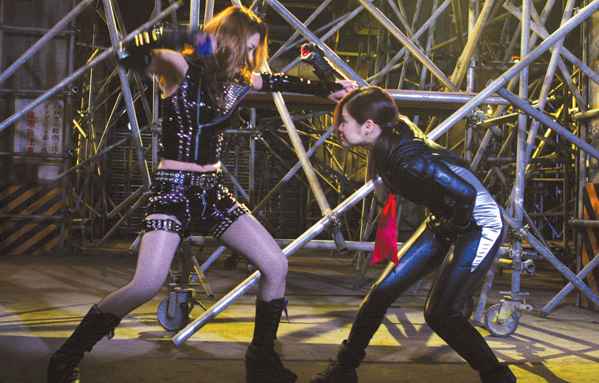★★★
“Angelic Upstarts”
 Eden Murphy (Miller) has a problem. She desperately wants to get into Pembroke College, but is currently on the wait list. However, classmate Barrett Schroder (Heller) has a congressman for a father, a letter from whom would surely push her application forward. Barrett isn’t exactly helpful, so along with friend Zara (Milliner), she crashes his party, hoping to press her case. A series of events ensue, resulting in Eden being trapped in a bedroom with a passed-out drunk Zara, and a phone belonging to one of Barrett’s friends, Gooch (Deusner). This has some incriminating video footage on it, apparently linking Barrett to the recent disappearance of another classmate. He is very keen to get it back, by any means necessary.
Eden Murphy (Miller) has a problem. She desperately wants to get into Pembroke College, but is currently on the wait list. However, classmate Barrett Schroder (Heller) has a congressman for a father, a letter from whom would surely push her application forward. Barrett isn’t exactly helpful, so along with friend Zara (Milliner), she crashes his party, hoping to press her case. A series of events ensue, resulting in Eden being trapped in a bedroom with a passed-out drunk Zara, and a phone belonging to one of Barrett’s friends, Gooch (Deusner). This has some incriminating video footage on it, apparently linking Barrett to the recent disappearance of another classmate. He is very keen to get it back, by any means necessary.
The first two acts here are fairly straightforward siege horror, with Eden trying to figure out how she and Zara can escape a situation that’s increasingly untenable. Their own phones were collected on the way into the venue, and Zara’s current state makes running for it a poor strategy. Instead, Eden has to fight a rearguard action, trying to bargain with the increasingly aggressive Barrett and his henchmen, while barricading their current location and repel attacks. It may helps that she is able to capture Gooch when he tries to climb in through a window, giving them a bargaining chip – and potentially a first-reported sighting of Chekhov’s Hair-dryer… That depends: Barrett might not care all that much about his “friend,” considering he caused the problem to begin with.
This is likely when the film is at its best, because neither Eden nor Barrett are idiots, and both know what’s at stake. This dynamic changes sharply when his parents (played by Dermot Mulroney and the late Anne Heche, to whom the film is dedicated) come home unexpectedly. You thought Bennett was willing to stop at nothing? Mrs. Schroder, in particular, cares not one whit how many bodies will need to be buried by the end of the night. To be honest, I felt this is where the film slipped over the edge of plausibility, quickly descending into carnage which teetered on the edge of ridiculous, and with some questionable pharmacology.
There were times where it almost felt there was a reel missing too, one escape teetering on the edge of “With one bound, she was free” territory. However, we still get a satisfactory final confrontation (remember that hair-dryer?), and I found myself rooting for Eden more than I thought I might at the beginning. There’s a sense of social commentary here, based around the concept of the rich and powerful being able to get away with anything. But it’s handled lightly enough not to get in the way, and despite problems in the final reel, I was adequately entertained. If it does feel that Miller may have been trying too hard to be an alternate to Samara Weaving, there are certainly much worse things to be!
Dir: Beth Hanna, Jerren Lauder
Star: McKaley Miller, Keyara Milliner, Wil Deusner, Brice Anthony Heller





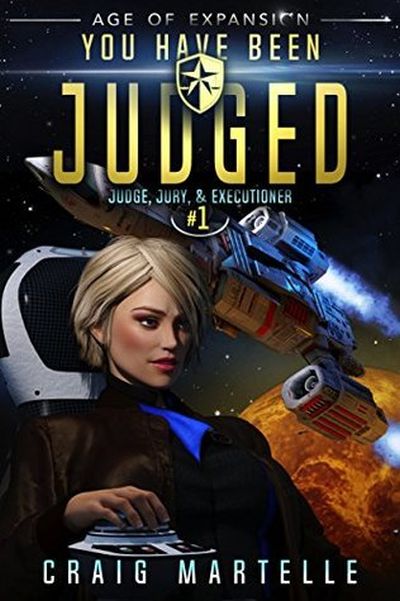 This is another entry in the sprawling Kurtherian Gambit universe, which must have well over a hundred books in it, by a slew of different authors. I’m gradually coming to a couple of conclusions: a) it’s a very loosely-tied series, and b) the quality varies. When you give your book a title like this, evoking the spirit of Judge Dredd, you are setting certain expectations. Unfortunately, this is a book which fails to meet them, with a heroine who never achieves the level of intensity necessary to live up to the series title: Judge, Jury, Executioner. It has reached 16 volumes, which suggests either there’s a market for it, or the author has too much time on their hands. No prizes for guessing my opinion.
This is another entry in the sprawling Kurtherian Gambit universe, which must have well over a hundred books in it, by a slew of different authors. I’m gradually coming to a couple of conclusions: a) it’s a very loosely-tied series, and b) the quality varies. When you give your book a title like this, evoking the spirit of Judge Dredd, you are setting certain expectations. Unfortunately, this is a book which fails to meet them, with a heroine who never achieves the level of intensity necessary to live up to the series title: Judge, Jury, Executioner. It has reached 16 volumes, which suggests either there’s a market for it, or the author has too much time on their hands. No prizes for guessing my opinion. The above odd combination is actually a fairly accurate assessment of what you have here. It’s a Yakuza action-thriller… but rather than being set in Tokyo or Osaka, is relocated to the Brazillian city of Sao Paolo. As an introductory credit helpfully informs us, this has the largest Japanese population of any city outside Japan. The story concerns two separate people’s quests for their pasts, which (to absolutely no-one’s surprise) turn out to be intertwined. One of these is Akemi (MASUMI), who as a young child was the sole survivor of a 1999 massacre of her Yakuza family back in Japan, was subsequently spirited away by allies and is now living in Brazil. The other is Shiro (Rhys-Meyers), an amnesiac who wakes up in hospital with no clue as to how he got there or his identity, except for a Japanese sword.
The above odd combination is actually a fairly accurate assessment of what you have here. It’s a Yakuza action-thriller… but rather than being set in Tokyo or Osaka, is relocated to the Brazillian city of Sao Paolo. As an introductory credit helpfully informs us, this has the largest Japanese population of any city outside Japan. The story concerns two separate people’s quests for their pasts, which (to absolutely no-one’s surprise) turn out to be intertwined. One of these is Akemi (MASUMI), who as a young child was the sole survivor of a 1999 massacre of her Yakuza family back in Japan, was subsequently spirited away by allies and is now living in Brazil. The other is Shiro (Rhys-Meyers), an amnesiac who wakes up in hospital with no clue as to how he got there or his identity, except for a Japanese sword. I really must get round to reviewing Wentworth. The Australian women-in-prison drama certainly deserves coverage here, and has provided some of the best television we’ve enjoyed in the 2010’s. I keep intending to do so, but suspect that will now likely have to wait until after the show comes to a conclusion, following its ninth and final season in 2021. In the meantime, however, I do get to review the Turkish remake of the show. If you’ve seen Wentworth, this version is perhaps as unnecessary as any Hollywood remake of a familiar foreign film. Yet there are enough differences – both in story and culture – that I didn’t mind too much.
I really must get round to reviewing Wentworth. The Australian women-in-prison drama certainly deserves coverage here, and has provided some of the best television we’ve enjoyed in the 2010’s. I keep intending to do so, but suspect that will now likely have to wait until after the show comes to a conclusion, following its ninth and final season in 2021. In the meantime, however, I do get to review the Turkish remake of the show. If you’ve seen Wentworth, this version is perhaps as unnecessary as any Hollywood remake of a familiar foreign film. Yet there are enough differences – both in story and culture – that I didn’t mind too much.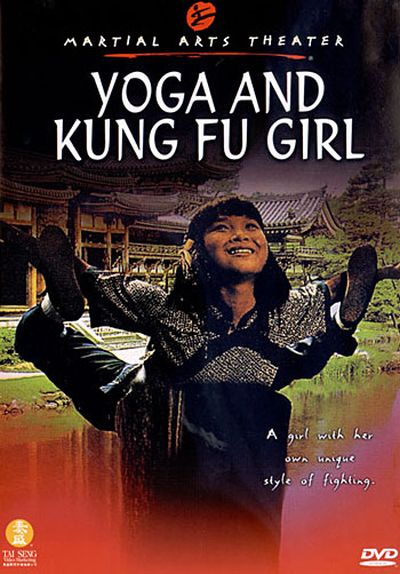 I’m trying to figure out if the “the” in the IMDb title used here is superfluous. “Yoga and Kung-fu Girl,” as on the DVD sleeve would make more sense, given the heroine’s martial arts are a combination of traditional skills with extreme flexibility. In some ways, it’s a slightly less exploitative version of things like The Crippled Masters, with its amputee-fu. The heroine here, Phoenix, could similarly make a living as a carnival exhibit, given her contortionist abilities, which are here shoe-horned into use to provide a style of fighting. To say this works with variable success would be an understatement. There are moments when her talents and flexibility are genuinely impressive. However, there are others where her limitations and lack of training are painfully apparent.
I’m trying to figure out if the “the” in the IMDb title used here is superfluous. “Yoga and Kung-fu Girl,” as on the DVD sleeve would make more sense, given the heroine’s martial arts are a combination of traditional skills with extreme flexibility. In some ways, it’s a slightly less exploitative version of things like The Crippled Masters, with its amputee-fu. The heroine here, Phoenix, could similarly make a living as a carnival exhibit, given her contortionist abilities, which are here shoe-horned into use to provide a style of fighting. To say this works with variable success would be an understatement. There are moments when her talents and flexibility are genuinely impressive. However, there are others where her limitations and lack of training are painfully apparent.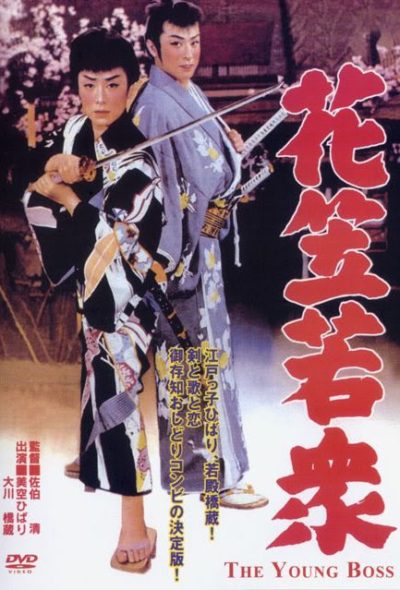

 If its predecessor (reviewed here as
If its predecessor (reviewed here as 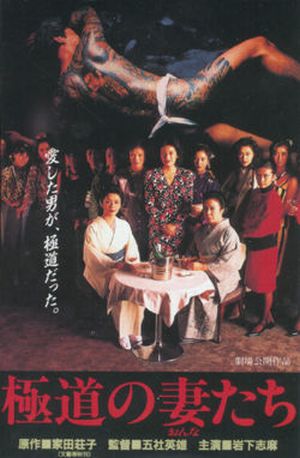 Perhaps a better title, however, would be Yakuza Sister, since this is a tale of two siblings. Tamaki (Iwashita) is an actual mid-level Yakuza wife, who is running their branch of the gang in the jailed absence of her husband, and doing quite well at it, enhancing its size and reputation. She is largely estranged from both her sister Makoto (Kitase) and their father – she’s a bartender, he works in his machine shop, but it’s clear from the get-go that his time is limited [this isn’t much of a spoiler when you see him coughing his lungs out while simultaneously chain-smoking]. Two things upset their semi-orderly lives. The overall head of Tamaki’s clan dies, opening up a power vacuum which sets off a struggle between rival factions, and Tamaki attempts to arrange a ‘suitable’ marriage for her sister. Makoto rebels, taking up instead with Kiyoshi Sugita (Sera) – which is unfortunate, because he’s a loyal member of the faction now battling Tamaki’s group for control.
Perhaps a better title, however, would be Yakuza Sister, since this is a tale of two siblings. Tamaki (Iwashita) is an actual mid-level Yakuza wife, who is running their branch of the gang in the jailed absence of her husband, and doing quite well at it, enhancing its size and reputation. She is largely estranged from both her sister Makoto (Kitase) and their father – she’s a bartender, he works in his machine shop, but it’s clear from the get-go that his time is limited [this isn’t much of a spoiler when you see him coughing his lungs out while simultaneously chain-smoking]. Two things upset their semi-orderly lives. The overall head of Tamaki’s clan dies, opening up a power vacuum which sets off a struggle between rival factions, and Tamaki attempts to arrange a ‘suitable’ marriage for her sister. Makoto rebels, taking up instead with Kiyoshi Sugita (Sera) – which is unfortunate, because he’s a loyal member of the faction now battling Tamaki’s group for control.
 “Yo-yo. Girl. Cop,” said Chris, burdening those three words with sarcasm, as only she can, and giving me one of those sidelong glances, heavy with additional meaning. Hey, what can I say. This was an unexpected revival of the series, from 2006, with the lead played by pop singer Matsura. She is a wild-child coerced into undercover work by Kazutoshi Kira (Takeuchi, from Takashi Miike’s Dead or Alive trilogy), to save her mother who is being held on espionage charges in the US [in a nice touch, Mom is played by Yuki Saito, who was the first live-action Sukeban Deka, in the original TV series]. Her mission – should she choose to accept it – is to go into a high-school and uncover those behind the threatening Enola Gay website, a neo-terrorist URL that now has a counter on it, with less than 72 hours remaining. She befriends Konno Tae (Okada), the meek victim of relentless bullying, and also encounters the school’s queen bee, Reika Akiyama (Rika Ishikawa – shown right, and another pop singer, like Okada part of the v-u-den group) and her clique. Can she work out what’s going down, and pull the plug on it?
“Yo-yo. Girl. Cop,” said Chris, burdening those three words with sarcasm, as only she can, and giving me one of those sidelong glances, heavy with additional meaning. Hey, what can I say. This was an unexpected revival of the series, from 2006, with the lead played by pop singer Matsura. She is a wild-child coerced into undercover work by Kazutoshi Kira (Takeuchi, from Takashi Miike’s Dead or Alive trilogy), to save her mother who is being held on espionage charges in the US [in a nice touch, Mom is played by Yuki Saito, who was the first live-action Sukeban Deka, in the original TV series]. Her mission – should she choose to accept it – is to go into a high-school and uncover those behind the threatening Enola Gay website, a neo-terrorist URL that now has a counter on it, with less than 72 hours remaining. She befriends Konno Tae (Okada), the meek victim of relentless bullying, and also encounters the school’s queen bee, Reika Akiyama (Rika Ishikawa – shown right, and another pop singer, like Okada part of the v-u-den group) and her clique. Can she work out what’s going down, and pull the plug on it?